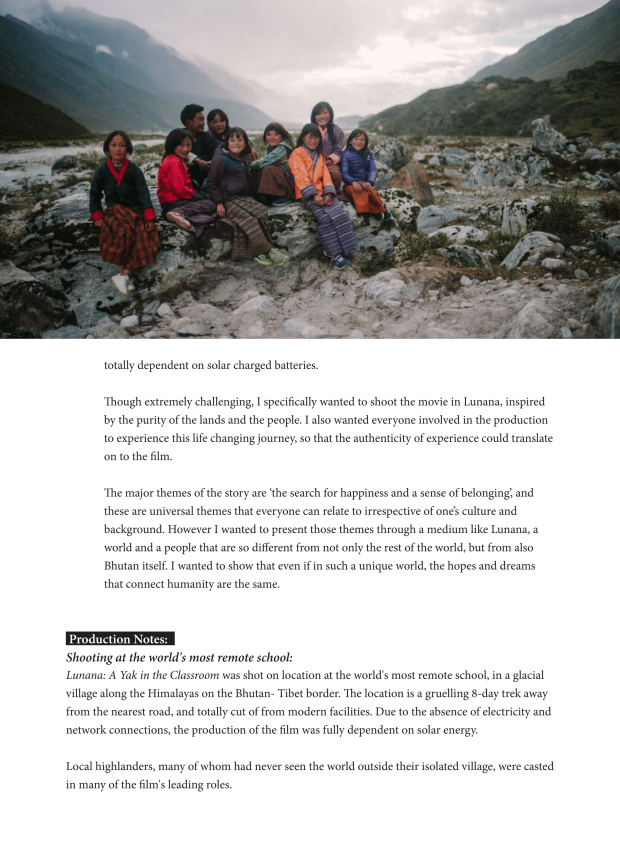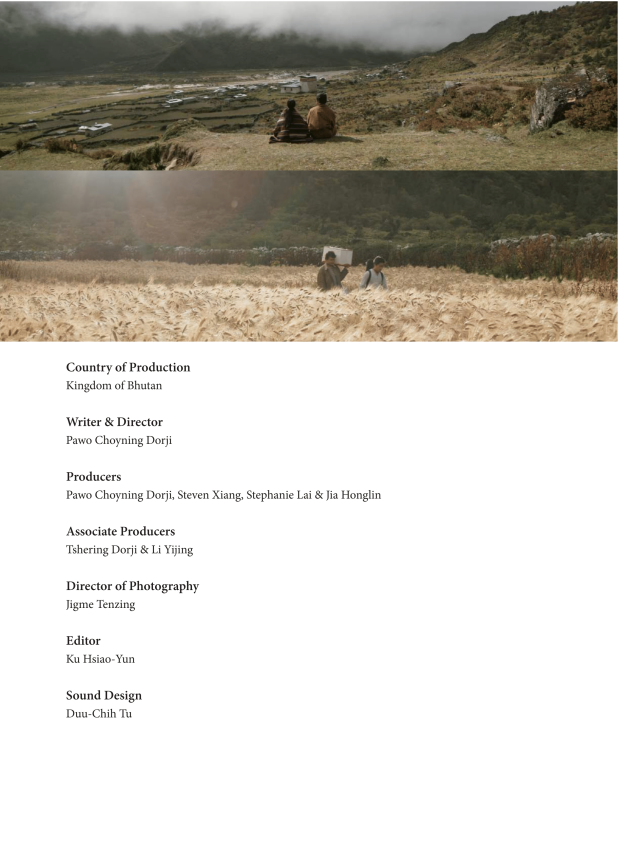Writer/director Pawo Choyning Dorji’s heartfelt Lunana: A Yak in the Classroom will charm the pants off of you – or, rather, the robes off of you. Because this captivating feature was shot mostly in the hard-to-get-to Kingdom of Bhutan, a Buddhist nation of less than 1 million inhabitants straddling the Eastern Himalayas between India and the Tibet region of the People’s Republic of China. Indeed, Lunana was largely lensed on location in the actual village of that same name, a remote, tiny hamlet, which translated into English Lunana means: “The Dark Valley.” Minus electricity, let alone Internet connectivity and cell receptivity, Dorji’s crew had to shoot on location there using solar power batteries.
But what Lunana lacks in “modern” technical amenities it more than makes up for with majestic, mountainous scenery and the spiritualism of its 56 or so inhabitants. It is at this high-altitude outpost that our protagonist, Ugyen (Bhutanese thesp Sherab Dorji making his silver screen debut), is consigned by the Bhutanese government to teach at the far-flung, ill equipped village school. Ugyen resists being posted there, but I suspect he is obligated to serve out the fifth and final year of a contractual agreement he has made with the Kingdom, perhaps in exchange for his receiving a government provided university education. (This, like mush else in this mystical movie, is not fleshed out in the script by the first-time screenwriter, even though Dorji had plenty of time to do so in his 110-minute directorial debut.)
Ugyen yearns to emigrate to Australia to be a pop musician there (as if Westerners really need outsiders to relocate in the West only to emulate and imitate them – not to contribute something from their authentic, original culture). Obliged to fulfill his government service, Ugyen puts his dream of migrating to a “modern” society aside to make the arduous, eight-day, uphill trek to the extremely faraway Lunana, that is so off the beaten path there actually isn’t a path per se to get there. As a resident of Bhutan’s capital and largest city, Thimphu, with a population of about 100,000, in comparison to the villagers he encounters Ugyen is a “city slicker” and appalled at how “primitive” the village and school of Lunana are, and upon arriving he immediately informs the headman Asha Jinpa (Kunzang Wangdi) he wants to leave.
But the children he is to teach have another thing in mind. With their earnest desire to be educated, respectfulness, and above all, their simply irresistible charm, the adorable tykes seek to win “Sir” over. Cutest of all is the preternaturally lovable Pem Zam (played by an actual villager named Pem Zam), who is the “school captain.” With their sincerity and simplicity, will the children plus the mostly good people of the village be able to convince the revered, educated Ugyen to stay to impart some of his acquired wisdom to the eager pupils?
Ugyen is confounded by the fact that his bare classroom doesn’t even have a blackboard. And when it’s proposed that the eponymous yak be posted in his classroom to help keep it warm, will the would-be singer say: “Yakety yak, don’t talk back!”? Moviegoers are likely to discern where this gentle tale is taking us, as we’ve seen this fish-out-of-water educator in movies about teachers before, albeit in much different settings.
Glenn Ford may have fought “Indians” (feather, not dot) and gunslingers in Westerns such as 1955’s The Violent Men and gangsters in Film Noir movies like 1953’s The Big Heat, but Ford faces “big city savages” at a high school in 1955’s Blackboard Jungle, co-starring the recently departed Sidney Poitier as one of those “teenage terrors in the schools.” In 1967’s To Sir, with Love the grown-up Poitier plays a teacher confronted by mostly white pupils from London’s slums. That same year Sandy Dennis portrayed a “good girl” teacher who faces the “monster” – hardboiled New York City students in the urban education drama Up the Down Staircase. In 1974 Jon Voight depicted Pat Conroy in the autobiographical Conrack, who is dispatched to teach all-Black pupils (including the beautiful Tina Andrews) who speak the Gullah dialect, at an isolated school off of South Carolina’s coast at underdeveloped Yamacraw Island. In 1995’s Dangerous Minds Michelle Pfeiffer’s ex-marine taught at a tough ghetto high school, just as Hillary Swank educated at-risk teens in 2007’s Freedom Writers.
Lunana shares some of these films’ characteristics, although it is the children’s gentleness and willingness to learn that Ugyen has to deal with, not their brutality. Dorji’s movie is also different in that the educator protagonist, like his scholarly charges, are all the same nationality, Bhutanese (just as the titular headmaster in Goodbye, Mr. Chips is, like his students, British). But what differentiates Ugyen from his pupils is not ethnicity per se but rather the fact that he comes from an urban center and is “modernized.” In this respect Lunana deals with the contradictions, tensions and issues of development, including people from traditional, developing lands coping with more technologically “advanced” societies. Ugyen is to the Lunana villagers what Australia is to Ugyen. The 1979 Samoan/New Zealand film Sons for the Return Home, based on the Polynesian writer Albert Wendt’s novel of the same name, treads on similar terrain.
One of the many joys of Lunana is that – like Robert Flaherty’s 1920s classics Nanook of the North and Moana of the South Seas – Dorji has created an “ethnofilm” set in a distant realm most viewers are unlikely to ever see and experience. Instead of northern Quebec or Savaii in Samoa, Lunana takes place in Bhutan, called the “land of the thunder dragon,” where the standard of living is measured by “Gross National Happiness.” I guess, Bhutan competes with Disneyland to earn the accolade of “the happiest place on Earth.”
And like those Italian Neorealist classics by De Sicca and Rossellini, Dorji casts “amateur” actors, with actual Lunana villagers and other Bhutanese cast members in their first screen roles. This enhances the sense of place, the film’s authenticity. The style unspools in a very naturalistic manner, and aside from sumptuous long shots revealing the optical opulence of the Himalayan splendor, there may be only one brief “cinematic” flourish momentarily glimpsed onscreen. The cinematographer is Jigme Tenzing and I couldn’t help but wonder if he is related in any way to the great Sherpa mountaineer Tenzing Norgay, who climbed Mt. Everest with Edmund Hillary; Tenzing’s father was a Tibetan yak herder. (Tenzing is portrayed in the 2016 New Zealand TV series Hillary by Darren Young.)
Lunana is also earthy, especially in terms of scatological references. Unfortunately, Ugyen’s relationships aren’t so earthy; his interactions with the lovely singer Saldon (Kelden Lhamo Gurung) at the village are more ethereal than romantic. In the beginning of the movie, when he departs Thimphu, the reluctant teacher doesn’t even kiss his citified girlfriend goodbye on the lips.
Despite its chasteness, I thoroughly relished Lunana and had a smile on my lips throughout the entire movie. Perhaps it’s because, on a personal note, it reminded me of my days as a young teacher at Leone High School in Pago Pago, American Samoa and at Avele College in Upolu, where I lived out in the distant villages as the only solo white man in Western Samoa who was nonaffiliated with missionary organizations, the Peace Corps (whose major contribution to Samoa was the introduction of marijuana, I kid thee not), et al.
Nevertheless, one doesn’t have to have been an instructor abroad to enjoy this simple, splendid treat for the soul and eyes. To like if not love Lunana viewers simply have to appreciate watching something uplifting, that will make them smile and feel glad to be alive by the time those final credits roll and audiences return to their daily, ordinary routines with, perhaps, a renewed, higher sense of meaning as to what “it’s all about.” You may not attain enlightenment by the end of the movie but you are very likely to have an entertaining, good time for all members of the family – including your yaks.
Lunana: A Yak in the Classroom is in Bhutanese with some spoken English and English subtitles. It has been nominated for and won numerous awards, including three prizes at the Palm Springs International Film Festival and is believed to be an Academy Award contender for Best International Feature Film. Lunana has been theatrically released in New York, San Francisco, Miami and in Los Angeles at the Laemmle Royal, Laemmle Playhouse 7, and Laemmle Town Center 5



